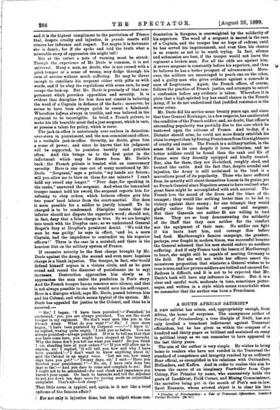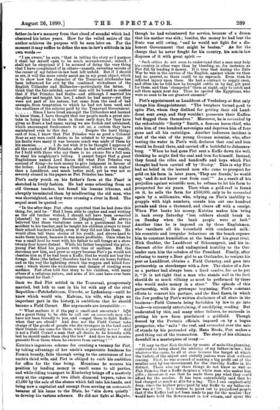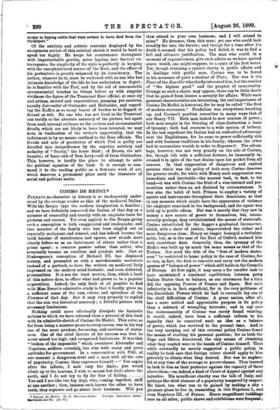A SOUTH AFRICAN SATIRIST.*
A NEW satirist has arisen, and, appropriately enough, from Africa, the home of surprises. The anonymous author of Prinsloo of Prinsloosdarp, a true disciple of Swift, has not only levelled a trenchant indictment against Transvaal officialdom, but he has given us within the compass of a hundred and thirty pages as brilliant and sustained an essay in political irony as we can remember to have appeared in the last thirty years.
The aim of the author is very simple. He wishes to bring home to readers who have not resided in the Transvaal the standard of competence and integrity reached by an ordinary Boer official, as exemplified in his relations with Outlanders, Hollanders, and Kaffirs. And in order to realise this aim he traces the career of an imaginary Voortrekker from Cape Colony, Piet Prinsloo by name, who successively holds the posts of Landdrost, Field Cornet, and Mining Commissioner, the narrative being put in the mouth of Piet's son-in-law, Sarel Erasmus, whose avowed object is to clear his late
a Tale of Transvaal, Officiaidem. London t
father-in-law's memory from that cloud of scandal which had obscured his latter years. How far the veiled satire of the author achieves its purpose will be seen later on. For the moment it may suffice to define the son-in-law's attitude in his own words:—
"I am aware," he says, "that in telling the story as I purpose I shall lay myself open to he much misunderstood ; indeed, I shall not be surprised if I be accused of doing the very thing that I have complained of in others—namely, revealing secrets of the career of my father-in-law best left untold. But if I should so err, it will the more surely assist me in my great object, which is to show how the character of the Transvaal Afrikander has been influenced for evil by the combined wickedness of the English Meander and Hollander—particularly the latter. I think that the fair-minded, oprecht man will be bound to confess that if Piet Prinsloo had faults—and although I married his daughter and taught him law, I admit he had many—yet they were not part of his nature, but came from the seed of bad example, from temptation to which he had not been used, and the smallness of the salaries paid by the Transvaal Government.
Since I have lived amongst the IIitlanders and learned to know them, I have thought that our people made a great mis- take in being kind to them in those early days, for they have given us Boers a bad name, saying we are foolish and unlearned, which encouraged freshcomers to rob us, a custom they have maintained even to this day Despite the hard things said of him, I know that Piet Prinsloo was as good a Colonial Boer as any man could desire to be related to by marriage. If his faults were many it was because much was made of them by
his enemies I do not wish it to be thought I approve of all the conduct of Piet Prinsloo after he had attained to wealth, for I hold with those who say there is no excuse for a full man to steal his neighbour's biltong. I cannot forget that a great Englishman named Lord Bacon did what Piet Prinsloo was accused of doing—he took money to give judgment in favour of the briber. Lord Bacon was a Chancellor, which is even higher than a Landdrost, and much better paid, yet he was not so severely abused in the papers as Piet Prinsloo has been."
Piet's early youth on his father's farm at the Pearl is sketched in lively fashion. He had some schooling from an old German teacher, but found his lessons irksome, and abruptly terminated them by misdirecting the old man, who was shortsighted, as they were crossing a river in flood. The sequel must be quoted :-
"In the after days Piet often regretted that he had done thin thing, for, said he : ' Had I been able to cypher and read writing as the old teacher wished, I should not have been verneuked [cheated] by so many Rooineks [Englishmen]' He always believed that these visitations came as a punishment for the accident to his teacher, and he taught his children always to treat their school teachers kindly, even if they did not like them. He would often tell them stories of his youth, and strove hard to make them honest, because it was more profitable. Once when he was a small kerel he went with his father to sell forage at a store twenty-four hours distant. While his father bargained the price, young Piet filled his pockets with tins of sardines. But the storeman saw him, and grew so angry because Piet's pa would not chastise him as if he had been a Kaffir, that he would not buy the forage. Hans [the father] therefore had to trek six hours further, and on the way the lightning struck the waggon and killed four oxen ; which shows the wickedness and danger of stealing even sardines. Piet often told this story to his children, with many others of a religious nature, and none of his sons have ever been imprisoned for theft."
Soon we find Piet settled in the Transvaal, prosperously married, but loth to cast in his lot with any of the rival Republics—Potchefstroom, Utrecht, or Lydenburg—until he knew which would win. Katrina, his wife, who plays an important part in the history, is ambitions that he should become a Field Cornet. Her arguments are irresistible :—
"' What matters it if the pay is small and uncertain ? Is:it not a great thing to bo able to call out on commando men who have not been friendly to you, and compel them to fight Kaffirs when they are afraid ? And does not the Field Cornet take charge of the goods of people who die strangers in the land until their friends can come for them, which is generally never ? And is not a Field Cornet a man that all . desire to be friendly with lest he should make them obey the law ? And does he not receive presents from those whom he excuses from serving?' " Katrina's ingenious scheme for creating a vacancy for Piet, by taking advantage of her uncle's unpatriotic fondness for French brandy, falls through owing to the astuteness of her uncle's third wife, and Piet is obliged to curb his ambition for office for the time being. Meantime he secures his position by lending money in small sums to all parties, and while riding transport to Kimberley brings off a masterly coup at the expense of two illicit diamond buyers, rakes in• £1,000 by the sale of the stones which fall into his hands, and being now a capitalist and exempt from serving on commando becanee of his loans to the State, -he. "sits down quietly " to develop his various schemes. He did not fight at Majuba,
though he had volunteered for service, because of a dream that his mother was sick; besides, the money he had lent the State was still owing, " and he would not fight for a dis- honest Government that might be beaten." As for the charge that he never fought for his country, his son-in-law disposes of it with great spirit :-
" Such critics do not seem to understand that a man may help his country in other ways than by bleeding, as, for instance, as Piet did, by lending it money. It is true that during the Zulu War he was in the service of the English, against whom we then had no quarrel, so there could be no reproach. Even then he inflicted injury upon them. He had a contract to supply oxen, and often has he told how he brought cattle in by day, got paid for them, and then stampeded' them at night, only to catch and sell them again next day. Thus he spoiled the Egyptians, who were so soon to be our greatest enemies."
Piet's appointment as Landdrost of Vrededorp at first only brings him disappointment. " The burghers turned good to
spite Piet, whom they disliked for getting their old Land- drost sent away, and they wouldn't prosecute their Kaffirs, but flogged them themselves." Moreover, he is verneuked by the redoubtable " Scotty " Smith, a famous horse-thief, who robs him of two hundred sovereigns and deprives him of four guns and all his cartridges. Another ludicrous incident is that of the visit of the young German scientist, who, after tasting the water in Piet's well, declares that coal and iron would be found there, and carried off a bottleful to Johannes- burg. " When he had gone Piet sent a Kaffir down the well, thinking he might find the coal and iron for himself. Instead, they found the rifles and handcuffs and keys which Piet thought had been carried off by Scotty.' This is why Piet had no belief in the learned men who came to prospect for gold on his farm in later years, 'They are frauds,' he would say, ' and do not know rust froin coal.'" As a result of his prejudice against scientific men, he refuses to let his farm be prospected for six years. Then when a gold-reef is found on it, he sells the farm for £100,000, only to be verneuked again by a millionaire, who, relying on Piet's inability to grapple with high numbers, counts him oat one hundred pounds and then a thousand, and clears off with a receipt. When Piet banks his money, Katrina makes him bring it back every Saturday "lest robbers should break in on Sunday when the bank people were at kerk."
Another time be is imposed on by three Englishmen, who vaccinate all his household with condensed milk; his eccentric and irregular behaviour on the bench exposes him to constant humiliation at the hands 'of his great rival, Nick Grobler, the Landdrost of Schoonapruit, and his in- discreet obiter dicta and undisguised hostility to the Out- lander earn him the rebukes of the President. Finally, after refusing to marry a Boer girl to an Outlander, he resigns his post as Landdrost, obtains a Field Cornetcy, and goes into partnership as storekeeper with a Jew. The choice of a Jew as a partner had always been a fixed resolve, for as be put it, " It is not right that a man who stands well in the kerk should do so much villainy as must be performed by those who would make money in a store." The episode of this partnership, with its grotesque beginning, Piet's constant efforts to convert his partner, and the final fiasco, in which the Jew profits by Piet's written disclaimer of all share in the business—Field Cornets being forbidden by law to gcr into trade—is extremely entertaining, if unedifying, reading. But undaunted by this, and many other failures, he succeeds in getting his new farm proclaimed a goldfield. Though fleeced by the Pretoria officials, imposed on by a bogus prospector, who " salts " the reef, and verneuked over the sale
of stands by his pretended ally, Hans Breda, Piet makes a good thing out of the transaction. The story of his ultimate downfall is a masterpiece of irony :-
" It may be that Nick Grobler, by means of mole-like planning, contrived to bring about the undoing of my father-in-law ; but whatever the cause, he all at once became the target at which the bullets of the unjust and sinfully jealous were shot without ceasing. First, he was accused of making a big profit out of the mealies sent by tne Government for the starving Kaffirs in his district. Those who say these things do not know so well as Piet Prinsloo that a Kaffir despises a white man who makes him gifts ; therefore it was that he made them pay what they could afford for the mealies. It has been untruthfully said that he had charged as much as £10 for a bag. This I can emphatically deny, since the highest price paid by any Kaffir to my father-in- law was .4:4 10a. It is useless to point out to prejudiced psop le that if the Kaffirs had not been made to pay for the mealies 1 hey would have held the Government in low esteem, and spent the
money in buying cattle that were certain to have died from the rinderpest."
Of the subtlety and artistic restraint displayed by the anonymous author of this satirical sketch it would be hard to speak too highly. He keeps his countenance throughout with imperturbable gravity, never lapsing into farcical ex- travagance, the simplicity of the style is perfectly in keeping with the unsophisticated nature of the Boer, and the effect of his portraiture is greatly enhanced by its consistency. The author, whoever he is, must be reckoned with as one who has intimate knowledge of the life he has undertaken to depict ; he is familiar with the Taal, and by the aid of innumerable circumstantial touches he brings before us with singular vividness the figure of the Transvaal Boer official, at once sly and artless, shrewd and superstitious, grasping yet cautions, equally distrustful of Outlander and Hollander, and regard- ing the Kaffirs as so many beasts of burden to be flogged or fleeced at will. No one who has not lived in the Transvaal can testify to the absolute accuracy of the picture, but apart from such internal evidence as the curious and circumstantial details, which are not likely to have been invented, we may note, in vindication of the writer's impartiality, that the indictment is by no means confined to the Boer officials. The frauds and acts of peculation of which Piet is guilty are dwarfed into insignificance by the superior subtlety and audacity of " Scotty," the horse thief ; of Brown, the mil- lionaire; of Isaac and of Sam Levy,—all of them Outlanders. This, however, is hardly the place to attempt to solve the political equation of the book. It is enough to com- mend it to the reading public as a first-rate work of art, which deserves a permanent place amid the literature of social and political satire.




































 Previous page
Previous page